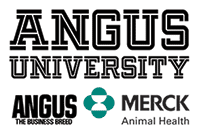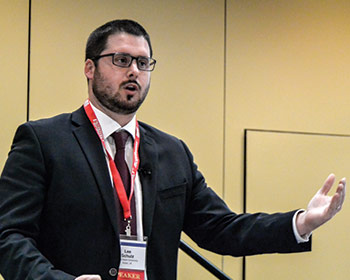
Should You Raise or Buy Heifers?
Iowa State University duo presents options for replacement females.
Much is beyond your control in the cow-calf business. Among the few you alone make is the call on replacement females. Will you keep and develop your own heifers or buy enough bred females from outside sources to maintain the herd size you want?

ISU colleague and beef cattle specialist Patrick Gunn explained some web-based tools to help with the decision of whether to buy or raise replacement females.
“The decisions should be based on long-term preferences,” said Iowa State University (ISU) economist and Extension livestock specialist Lee Schulz, presenting Nov. 6 at the 2016 Angus Convention in Indianapolis, Ind. “However, we live in a short-term world.”
Prices for heifer calves plummeted from as high as $225 per hundredweight (cwt.) a couple of years ago to perhaps $100 per cwt. in Fall 2016, Schulz noted. Bred heifers fell by a lower percentage, but still down a steep slope — perhaps $1,000 off the $3,000 peak in late 2014.
ISU colleague and beef cattle specialist Patrick Gunn explained some web-based tools (www.iowabeefcenter.org/agdmtools.html) to help with those decisions.
“The last few years, some producers felt they had to sell those expensive heifers,” he said, “also saving on development and labor costs. The spreadsheet (https://www.extension.iastate.edu/agdm/livestock/html/b1-73.html) showed they were ahead to buy 22-month-old bred heifers the next year.”
 For many, that decision was underlined by heat and drought stress that may have compromised long-term productivity in their raised heifers, Gunn added. The flip side of that is making sure the purchased heifers are adapted to the local environment.
For many, that decision was underlined by heat and drought stress that may have compromised long-term productivity in their raised heifers, Gunn added. The flip side of that is making sure the purchased heifers are adapted to the local environment.
“In general, raise your own if it costs less than buying, your genetic base is acceptable and your environment may be stressful to outside purchases,” he said. “Buy if it costs less, you value the alternative use of resources, and want rapid genetic improvement and herd growth.”
The ISU model in November showed buying at a disadvantage after seven future calves, but the formula includes projected weaning weights and calf prices, so reality could provide a different outcome, Gunn and Schulz noted.
A “net present value” calculator (www.extension.iastate.edu/agdm/livestock/html/b1-74.html) adds in the cost of interest and inflation, both so low now as to minimize their impact, but the tool showed a maximum bid of $1,336 for a bred heifer in that market trough of early November. If interest fell another point, that could be $1,409, or if more valuable calves will result, it could reach $1,500.

“Keep in mind that $4,000 for a bred heifer looked feasible at some point in 2014, just as $1,336 does now,” said ISU Extension livestock specialist Lee Schulz. “Reality suggests one was too high and this is too low.”
“Keep in mind that $4,000 for a bred heifer looked feasible at some point in 2014, just as $1,336 does now,” Schulz said. “Reality suggests one was too high and this is too low.
“The tool was built on a single-heifer decision,” he added, “but you buy and sell groups. You may get seven out of 10 to calve and breed back, but probably not all 10.”
Whether to keep replacements or buy bred females should be based on long-term profitability and matching genetics to the market, including consumer demand for beef, the ISU beef specialists concluded.
The session on buying vs. raising replacements was one of the Angus University Workshops sponsored by Merck Animal Health Nov. 6 at the 2016 Angus Convention. To listen to the presentation or access the PowerPoint, visit http://bit.ly/AC16-BuyVsSell. For comprehensive coverage of the Angus Convention, including speaker summaries, links to the full presentations, photos, videos and more, visit www.angus.media/news/Angus-Convention.

Editor’s Note: Steve Suther is director of industry information for Certified Angus Beef LLC.






